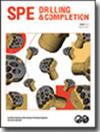Extended Reach Drilling with Coiled Tubing: A Case Study on the Alaskan North Slope That Proves the Benefits of Drilling a Straight Hole
IF 1.2
4区 工程技术
Q3 ENGINEERING, PETROLEUM
引用次数: 0
Abstract
A set of five wells were to be drilled with directional coiled tubing drilling (CTD) on the North Slope of Alaska. The particular challenges of these wells were the fact that the desired laterals were targeted to be at least 6,000 ft long, at a shallow depth, almost twice the length of laterals that are regularly drilled at deeper depths. The shallow depth meant that two of the five wells involved a casing exit through three casings, which had never been attempted before. After drilling, the wells were completed with a slotted liner, run on coiled tubing (CT). This required a very smooth and straight wellbore so that the liner could be run as far as the lateral had been drilled. In this paper, we focus on one of the two wells on which triple casing exit was performed. However, the same considerations and results apply to the other wells on which the same technology has been used. Various methods were considered to increase lateral reach, including running an extended reach tool, using a friction reducer, increasing the CT size, and using a drilling bottomhole assembly (BHA) that could drill a very straight well path. All of these options were modeled with tubing forces software, and their relative effectiveness was evaluated. The drilling field results easily exceeded the minimum requirements for success. This project demonstrated record-breaking lateral lengths, a record length of liner run on CT in a single run, and a triple casing exit. The data gained from this project can be used to fine-tune the modeling for future work of a similar nature.连续油管大位移钻井:以阿拉斯加北坡为例,证明了钻直孔的优势
在阿拉斯加北坡,将使用定向连续油管钻井(CTD)钻五口井。这些井面临的特殊挑战是,在较浅的深度,期望的分支井的长度至少为6000英尺,几乎是在较深的深度常规钻的分支井长度的两倍。由于井深较浅,5口井中有2口需要通过3套套管进行套管出口,这是以前从未尝试过的。钻井后,通过连续油管(CT)下入开槽尾管完井。这需要一个非常光滑和直的井眼,以便尾管可以下入到已经钻完的水平段。在本文中,我们重点研究了两口井中的一口,该井进行了三层套管出口。然而,同样的考虑和结果也适用于使用相同技术的其他井。为了增加水平段深度,研究人员考虑了多种方法,包括下入大位移工具、使用减摩器、增加连续油管尺寸,以及使用可以钻出非常直的井眼的钻具组合(BHA)。所有这些方案都用油管受力软件建模,并评估了它们的相对有效性。钻井现场的结果很容易超过成功的最低要求。该项目展示了破纪录的水平段长度、连续油管单趟尾管下入长度以及三层套管出口。从这个项目中获得的数据可以用来为将来类似性质的工作微调建模。
本文章由计算机程序翻译,如有差异,请以英文原文为准。
求助全文
约1分钟内获得全文
求助全文
来源期刊

SPE Drilling & Completion
工程技术-工程:石油
CiteScore
4.20
自引率
7.10%
发文量
29
审稿时长
6-12 weeks
期刊介绍:
Covers horizontal and directional drilling, drilling fluids, bit technology, sand control, perforating, cementing, well control, completions and drilling operations.
 求助内容:
求助内容: 应助结果提醒方式:
应助结果提醒方式:


